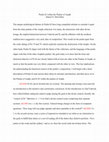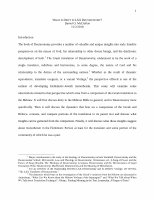Papers by Daniel McClellan
The publication of Thomas A. Wayment's The New Testament: A Translation for Latter-day Saints... more The publication of Thomas A. Wayment's The New Testament: A Translation for Latter-day Saints is a significant event that occasions not only a close examination of his work but also a discussion of how it fits into the complex relationship The Church of Jesus Christ of Latter-day Saints has long shared with Bible translation.
O ver the years 2 Maccabees has been subjected to all manner of critical analysis. The primary co... more O ver the years 2 Maccabees has been subjected to all manner of critical analysis. The primary concerns have been related to the date and provenance of the book, its historicity and chronology compared to 1 Maccabees, and its overall form and function. 1 Recently source critics have been at the 1. The first major work is C. Grimm, "Das zweite, dritte, und vierte Buch der Maccabäer, vierte Lieferung," in Kurzgefasstes exegetisches Handbuch zu den Apokryphen des Alten Testaments (ed. O.F. Fritische; Leipzig: S. Hirzel, 1857). During the mid-19 th century, scholarship began to grant preeminence to 1 Maccabees as the more historical (and thus valuable) of the first two Maccabean texts (see I.
The book of Deuteronomy provides a number of valuable and unique insights into early Israelite pe... more The book of Deuteronomy provides a number of valuable and unique insights into early Israelite perspectives on the nature of God, his relationship to other divine beings, and the diachronic development of both.1 The Greek translation of Deuteronomy, understood to be the work of a single translator, redefines and harmonizes, to some degree, the nature of God and his relationship to the deities of the surrounding nations.2 Whether as the result of dynamic equivalence, translator exegesis, or a variant Vorlage,3 the perspective offered is one of the earliest of developing Hellenistic-Jewish monotheism. This essay will examine some observations related to that perspective which arise from a comparison of the Greek translation to the Hebrew. It will first discuss deity in the Hebrew Bible in general, and Deuteronomy more specifically.
Religious Educator, Vol 10, No 3 (2009). ...
Journal of Book of Mormon Studies, 2020
For we labor diligently to write, to persuade our children, and also our brethren, to believe in ... more For we labor diligently to write, to persuade our children, and also our brethren, to believe in Christ, and to be reconciled to God; for we know that it is by grace that we are saved, after all we can do.-2 Nephi 25:23
Studies in Religion/Sciences Religieuses
Journal of Hebrew Scriptures
Journal of Hebrew Scriptures
Studies in the Bible and Antiquity
Scandinavian Journal of the Old Testament, 2016

Journal of Biblical Literature, 2018
Psalm 82 has long resisted a consensus regarding its genre. While some scholars have noted that t... more Psalm 82 has long resisted a consensus regarding its genre. While some scholars have noted that the psalm’s language overlaps with that of the complaint genre, several features of the psalm appear to complicate that reading. As a result, the framework of the divine council is frequently given interpretive priority, which has resulted in a variety of solutions to the psalm’s several interpretive difficulties and has also contributed to a general reluctance to consider the psalm within the literary context of the psalms of Asaph. I argue that the psalm’s interpretive difficulties are best resolved by understanding the psalm as a complaint, specifically a complaint put into the mouth of YHWH and addressed to the gods of the nations—a “gods-complaint.” This reading provides a new interpretive framework that may help resolve important questions related to the psalm’s compositional background, rhetorical function, and theological influence.
Religious Educator, 2019
A review article for Thomas Wayment's translation of the New Testament that also discusses Bible ... more A review article for Thomas Wayment's translation of the New Testament that also discusses Bible translation and The Church of Jesus Christ of Latter-day Saints.
This paper examines the interpretation of Psalm 82 in contemporary Latter-day Saint academic thou... more This paper examines the interpretation of Psalm 82 in contemporary Latter-day Saint academic thought.

This thesis has two primary goals: (1) to analyze the countours and extent of the generic categor... more This thesis has two primary goals: (1) to analyze the countours and extent of the generic category of deity in the Hebrew Bible, and (2) propose a semantic base for the term. It begins with a description of the fields associated with cognitive theory, and particularly cognitive linguistics. Chapter 2 examines the cognitive origins of notions of deity and discusses how this heritage is reflected within the biblical texts. The third chapter examines the conceptualization of Israel's prototypical deity, YHWH, beginning from the earliest divine profiles detectable within the text. In Chapter 4 the discussion returns to the generic notion of deity, highlighting references within the biblical text to deities other than YHWH. The conclusion synthesizes the different sections of the thesis, sketching the origins and development of the Hebrew Bible's representation of both prototypical and non-prototypical notions of deity. Implications for further research are then briefly discussed.

The unique mythological themes in Psalm 82 have long compelled scholars to consider it apart from... more The unique mythological themes in Psalm 82 have long compelled scholars to consider it apart from the other psalms of the Asaph collection. For many, the interaction with other divine beings, the implied distinction between Yahweh and El, and the affinities with the northern tradition have suggested a very early date of composition. This would set the psalm apart from the exilic dating of Pss 74 and 79, which explicitly mention the destruction of the temple. On the other hand, Psalm 82 aligns well with the theme of the collection, and the language of the psalm aligns with that of the other Asaphite psalms. My goal today is to show that the form and rhetorical objective of Ps 82 are closely linked with at least one other in the Psalms of Asaph, so much so that the psalm was very likely composed with the other in view. This has implications for understanding the historical context of the psalm's composition. I will begin with a short description of Psalm 82 and current ideas about its structure and function, and then move on to the Psalms of Asaph, and Ps 82 within the psalms of Asaph.
This essay provides a survey of the archaeological data which bear on the question of the histori... more This essay provides a survey of the archaeological data which bear on the question of the historicity of Josiah's reforms as represented in 2 Kings 22-23. I reach the conclusion that the account in 2 Kings is more rhetorical than historical.
The nature and function of Psalm 82 has long been a subject of debate. The text is rather brief a... more The nature and function of Psalm 82 has long been a subject of debate. The text is rather brief and has no real textual instabilities, but it stands out within the Hebrew Bible as the most steeped in mythological imagery. Pre-critical exegetes understood the gods of the narrative to be human judges, but subsequent textual discoveries and concomitant lexicographical advances, combined with more critical methodologies, have largely undermined that reading. A divine assembly setting has become widely accepted since the middle of the twentieth century. More contemporary scholarship focuses on the possible distinction between Yhwh and El within the psalm, the psalm’s form, and the related implications for its dating. This essay will offer a close exegetical examination of Psalm 82 with an aim to establishing the psalm’s form, function, and date of composition.

The book of Deuteronomy provides a number of valuable and unique insights into early Israelite pe... more The book of Deuteronomy provides a number of valuable and unique insights into early Israelite perspectives on the nature of God, his relationship to other divine beings, and the diachronic development of both. For example, Deut 32:8–9, as found in 4QDeutj, attests to a likely early distinction between Yahweh and Elyon and presents the latter as the overseer of the gods of the several nations of the earth. Deut 4:19 represents a later recasting of the relationship of Elyon (now identified with Yahweh) with those deities (now represented astrally). Multiple historical layers and theologies are represented.
LXX Deuteronomy redefines and harmonizes the nature of God and his relationship to the deities of the surrounding nations. Whether as the result of dynamic equivalence, translator exegesis, or a variant Vorlage, the perspective offered is one of the earliest of developing Hellenistic-Jewish monotheism. The unique nature of Deuteronomy’s references to other deities provides a rich backdrop against which to read the Greek translation. This paper will examine the view of divinity presented in LXX Deuteronomy and evaluate its relationship to that of the Hebrew text as it has been preserved to us. It will then discuss the implications of its divergences for the study of monotheism in the Hellenistic Period.

This investigation will approach the question of anti-anthropomorphism in LXX Exodus on three fro... more This investigation will approach the question of anti-anthropomorphism in LXX Exodus on three fronts. First, it will evaluate the translation technique employed by the translator of LXX Exodus and develop a methodology for the interpretation of variations between the Greek and the Hebrew. A brief analysis of characteristics of free translation in LXX Exodus 20–25 will contribute to this methodology. An important conclusion will be the need to examine divergences first for the possibility of a deviating Vorlage, and second for translator exegesis. Recent scholarship has tended in this direction and it will be further validated in the course of the investigation. Part two of this paper will examine the theological issues related to anthropomorphism in MT and LXX, and seek to account for the perspective of LXX Exodus, as far as it can be detected. I will identify and evaluate possible attempts by the translator to mitigate, as well as occasionally introduce, anthropomorphisms. This will help isolate aspects of the translator‘s theological outlook. The texts which illuminate this outlook in Exodus are few in number, and so this research must be considered preliminary, but some trends will still be evident. I will also discuss briefly the textual transmission of LXX Exodus' Vorlage.










Uploads
Papers by Daniel McClellan
LXX Deuteronomy redefines and harmonizes the nature of God and his relationship to the deities of the surrounding nations. Whether as the result of dynamic equivalence, translator exegesis, or a variant Vorlage, the perspective offered is one of the earliest of developing Hellenistic-Jewish monotheism. The unique nature of Deuteronomy’s references to other deities provides a rich backdrop against which to read the Greek translation. This paper will examine the view of divinity presented in LXX Deuteronomy and evaluate its relationship to that of the Hebrew text as it has been preserved to us. It will then discuss the implications of its divergences for the study of monotheism in the Hellenistic Period.
LXX Deuteronomy redefines and harmonizes the nature of God and his relationship to the deities of the surrounding nations. Whether as the result of dynamic equivalence, translator exegesis, or a variant Vorlage, the perspective offered is one of the earliest of developing Hellenistic-Jewish monotheism. The unique nature of Deuteronomy’s references to other deities provides a rich backdrop against which to read the Greek translation. This paper will examine the view of divinity presented in LXX Deuteronomy and evaluate its relationship to that of the Hebrew text as it has been preserved to us. It will then discuss the implications of its divergences for the study of monotheism in the Hellenistic Period.